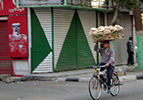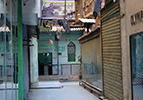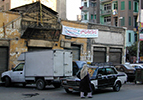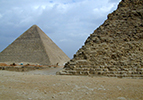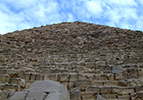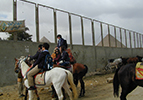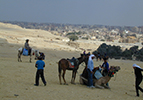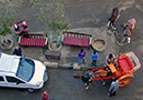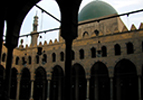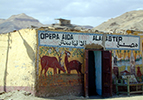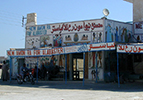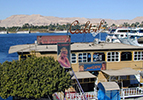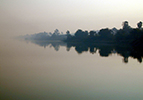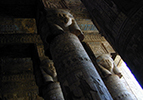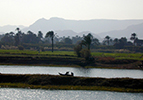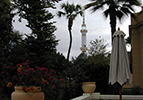When I traveled to Egypt for ten days in the middle of January 2011, I little suspected a revolution would erupt a week after my return to New York. Since childhood, I was fascinated by ancient Egypt and especially by the images of temples and papyri I had in my picture books. More recently, I had become intrigued by Egyptian theatre and popular music. My colleague, Marvin Carlson, who teaches Arabic theatre and has visited Cairo many times, suggested to me in December 2010 that January would probably be a good time to visit because the unrest following the November parliamentary elections seemed to have died down. And he put me in touch with theatre people I could meet when I was in Cairo.
For the first time during my travels abroad, I decided to keep a journal, expecting that I would want to record and process the extraordinary experiences I knew I was going to have. Since I am a careful observer of foreign cultures and always try to get to know local artists, this journal, quite unintentionally, became schizophrenic: half a Western tourist’s Orientalist musings and half the attempts of a student of culture to understand Egypt’s political and cultural economies. Reading it again in light of the uprising in Tahrir Square, I realized that my schizophrenic prose had unwittingly captured a “state of emergency,” a moment of coming-into-being, which, Walter Benjamin notes, “is not the exception but the rule,” and of which we become sensible only by hearkening to the “tradition of the oppressed.” These entries thus document a state of emergency which, like all such states, becomes recognizable only in retrospect. To my own journal, I append the first two emails I received from Egyptian friends after the revolution began.
January 8, 2011
My friend Charles and I arrive in Cairo, exhausted but wired, after a very long two days in transit, at a beautiful, newly remodeled hotel, the Kempinski Nile. If the intent is to make us feel like Pharaohs, it works; the hotel is exceedingly luxurious and the staff takes very good care of us. Before leaving, I had read Flaubert’s accounts of Egypt and I am quite aware of the contradiction between my anti-colonialist politics and my willingness to indulge in Oriental luxury. As an affluent North American in a country where the per capita income is less than $15 a day, I sit in my room with a view, on one side, of the Nile and, on the other, of the debris-covered rooftops. It is so clear that this disparity is not a question of “East” versus “West” but of the few who control the world’s wealth versus the impoverished many.
After dinner we walked up the Nile, admiring the palm trees, boats, and private clubs, all heavily guarded. Because everything in Cairo is guarded by armed sentinels. The entrances to all hotels and office buildings have x-ray machines and metal detectors. Embassies, universities, churches, government buildings, museums, and many other sites have armies of guards with machine guns and huge, bulletproof shields. The ubiquity of police and soldiers reminds you that Egypt is the fourth largest recipient of U.S. aid, 80 percent of it in the form of military assistance. Given the firepower these men have at their fingertips, I think how easy it would be to rise up: “You have nothing to lose but your chains.”
January 9, 2011
Downtown Cairo is a total hodgepodge architecturally in which every building is in some stage of decay. The main thoroughfares are packed like 34th Street on Christmas Eve. Outside the commercial districts, it can be quiet and lovely, but cars are everywhere, many of them ancient Fiats and Ladas, and in some streets they’re parked two or three deep. Some are clearly derelict despite the fact that every other storefront seems to be some sort of do-it-yourself car repair. There are lots of older, colonial buildings that are abandoned and simply falling apart, with broken windows, overrun with creeping vines.
January 10, 2011
We spent most of the day among the Pyramids, the first part on horseback, the second part in a restaurant with a view of the Sphinx where we met Dalia Basiouny, a former student—and political activist. From the restaurant terrace, we watched a son et lumière which looked like an outtake from Cleopatra.
The Pyramids are right on the edge of the city. It would be like taking the subway out to Flushing except instead of Shea Stadium, you find the Pyramids. What can you say when you’re faced with the most magnificently perfect heaps of rocks in the universe? But it’s difficult to have a Flaubertian perfect moment because you are also surrounded by sandaled peddlers trying to sell you a Fanta and tourists on their horses and camels texting their friends, or more likely, their stock brokers. So it’s completely and profoundly of our historical moment—at its most surrealistically and secularly weird.
January 11, 2011
Met Dalia, who drove us to Coptic Cairo, which is an old part of the city under very, very heavy guard (after the New Year’s bombing of a Coptic church in Alexandria). We toured several old churches; the cemetery, which is truly a city of the dead; and a magnificent, desanctified synagogue, by far the most sumptuous of the houses of worship in that quarter. And because of all the armed guards, it was very quiet, except for busloads of Japanese and American tourists. What was most astonishing about the Coptic churches, the synagogue, and the mosques is to see the deep similarities, in terms of art and design, among the three Abrahamic religions. You can see how early Coptic art was turning into Islamic art, long before Mohammed entered the picture.
Dinner with some theatre colleagues from the American University, Stancil Campbell and Jeanne Arnold, who took us to a wonderful Lebanese restaurant and told us about the many, many challenges of teaching in Egypt. The fact that every play they produce, including student work, has to be vetted by censors, who even attend rehearsals. Since most, however, are not fluent in English, they usually leave after an hour or so and are at least as concerned with sexual modesty as with politics. (Officially, the government denies there is censorship of any kind.) Stancil and Jeanne were also telling us how the student body has changed, that it used to be primarily children of diplomats and the very small Egyptian haute bourgeoisie but that now one is more likely to find spoiled, rich kids from all over the Arab world.
January 12, 2011
After a day of walking, we had drinks with Hazem Azmy, a doctoral student from the University of Warwick, who took us to a dilapidated downtown hotel, where, after passing through the most perfunctory security check, we went up to a lovely roof garden. Hazem specializes in Egyptian theatre and culture and he was telling us, as Dalia had, about the deep, deep discontent among Egyptians of almost every class and anger at the apparently interminable dictatorship of Hosni Mubarak who, with billions of U.S aid, has ruled Egypt for thirty years with an iron fist and virtually shut opposition parties out of the government. Hazem contends that popular rage has been building for years and was especially palpable after the November elections. He expects it to boil over but doesn’t know when or how it will happen or what it will lead to, but he’s convinced that Mubarak’s days are numbered. We then met the playwright Lenin El-Ramly, whose play In Plain Arabic I had just read. Named after the Soviet revolutionary by his left-wing parents, he is extremely charming and projects an air of fierce independence. And tonight he was delightedly holding court, chain-smoking, and speaking in English and Arabic (with Hazem translating). His plays are wonderfully dark, absurd comedies, a bit like Pirandello, although when I suggested that, he vociferously objected. Although they seemed highly political to me, he denied they were, saying that political theatre is all about left versus right. Instead, he said, his plays are satires of cronyism, stupidity, short-sightedness, and what he calls “thought terrorism.” And he prides himself on the “cunning” he uses to disguise his critique to make it palatable to the censors and exciting for audiences.
January 13, 2011
We met Dalia, who was now wearing a head scarf because she would be taking us to the heart of Islamic Cairo. We went into three beautifully restored houses from the 17th–18th centuries, with carved dark wooden window screens, in which the men’s quarters are carefully segregated from the women’s. Then to the souk, which was teeming and magnificent. As late afternoon crept upon us, we visited the Madrassa and Mausoleum of Qalaun, one of the most awe-inspiring mosques I have ever seen. Beautifully restored. Then, as twilight descended, the call to prayer sounded and Dalia took us into the Mausoleum where the echoes of the muezzins’ cries swirled around Qalaun’s massive stone walls.
Then to Aida at the Cairo Opera, on the 140th anniversary of its premiere. The Opera is able to maintain an elite audience not by inflated ticket prices—we obtained the best seats for about $40 each—but by requiring all men to wear a jacket and tie. I was not expecting a great performance but I wanted to see how they would stage this patently colonialist opera that was, after all, written to order for Cairo and the opening of the Suez Canal. Although it dates only from 1988, the opera house looks like a Nasser era project, with a pink auditorium and pink seats and was maybe 2/3 full: half upper-middle-class Egyptians, most of whom seemed understandably bored, and half curious tourists. The mise en scène was very Vegas, circa 1960. The sets and costumes were (sort of) spectacular and tacky. But the weirdest part of the performance was the appearance of the Nubian slaves in the act 2 ballet. There were about 25 of them, in blackface, wearing dark brown unitards with little off-white tasseled belts (like loincloths) around their waists and smaller ones around their knees. I half expected to see them adorned with bananas because their dancing was pure minstrel show, and even included the Josephine Baker shimmy, à la Princesse Tam Tam.
I should bear in mind, however, what Dalia told us about the plays produced by the Egyptian National Theatre, which clearly are comparable: over-produced and badly designed, unimaginative, and stylistically conservative to guarantee that no dialogue about social issues could ever take place. So I suspect that the Cairo Opera merely reproduces what is, in fact, the house style of the Egyptian state-supported theatres.
January 14, 2011
We fly to Luxor, formerly known as Thebes, the ancient capital, which is the largest tourist center in Egypt but quiet and unpolluted in comparison with Cairo. Its popularity is quite understandable considering that the main attraction here, the Temple at Karnac, which, besides being huge (the size of 13 Gothic cathedrals), is the most astonishing ancient monument I’ve ever seen. All I wanted to do was wander through it very slowly, despite the fact that there were (literally) 40 busloads of tourists. But it was easy to escape them—just find something that is breathtaking in its details but not monumental. Abracadabra: no tourists. If I were religious, I would swear that Karnac is still inhabited by the gods.
Our hotel, the vintage 1886 Winter Palace is a throwback to colonial times, posh, in a slightly shabby way, and filled with the same mix of Europeans and Japanese we saw at Karnac.
January 15, 2011
To the Luxor Museum and then to a nearby hotel for a mediocre pizza. After dinner, hearing loud, live Arabic music, we walked up the stairs to the terrace of the hotel. And I thought: a belly dancer? No, a whirling dervish. Dalia had told me that Egyptian dervishes are much better than Turkish ones and this one was amazing. I’d never before seen a live dervish, and he was brilliant. Looking like an 18-year-old version of Prince, this skinny Egyptian guy was wearing multiple sets of skirts over a black silk tunic with gold trimming, each skirt (7 or 8 feet in diameter) scented and radiating multicolored panels, with a different pattern on the reverse side. He performed the most gymnastic dance, peeling black, white, and then green panels of silk off his turban and blindfolding himself with them as he whirled. With his skirts billowing, he slowly removed one and tossed it to the floor, then the next, then the next. There were about ten people watching, all Egyptian, with the men and the women sitting on opposite sides of the terrace. The men seemed as thrilled as the women by this almost shockingly erotic display, a kind of intensely sexual, wildly acrobatic striptease, from the turban down. All this splendor, with the dervish’s feet sheathed in white go-go boots! It was worth eating a mediocre pizza for—or rather a thousand and one mediocre pizzas.
January 17, 2011
Our last day, and after a trip to the west bank to see the Temples of Hatshepsut and Ramses III, we sit in the stately lobby of the Winter Palace, waiting to leave for dinner and then the airport. We had to check our luggage for the day and the slightly sinister-looking bellhop asked me where I was from. When I said the United States, he gave me a suspicious look but then smiled and said, “Obama,” as if that one word would make everything right. For the first time since leaving New York—and two days after the overthrow of the dictatorship in Tunisia—I read the Herald-Tribune. I was especially interested, and a little nervous, when I read a front-page story, by Anthony Shadid, who wrote that “2011 may prove to be the year that the status quo in the Middle East and North Africa proves untenable and begins falling apart.” Shadid echoes what Dalia and Hazem had told me, highlighting the growing inequality and the fact that most Arab leaders are completely out of touch with the increasingly well-educated and immiserated majority. “Arab states,” he writes, “looked exhausted, ossified and ideologically bankrupt, surviving merely to perpetuate themselves. Never has the divide between ruler and ruled seemed so yawning, and perhaps never has it been so dangerous.” Sitting in the quiet seclusion of the Winter Palace, I suddenly have a vision of the 1975 U.S. evacuation of Saigon, people desperately trying to grab onto the landing gear of the departing helicopters, and I am suddenly glad we are leaving Egypt in twelve hours.
Having some time to kill, I walk out into the lush hotel garden, strolling along its shaded paths as the afternoon grows late and the shadows lengthen. It is truly breathtaking, especially now, as night descends, when the blossoms of the evening jasmine begin to open and their sublime fragrance fills the air. It is the sweetest, most delicate perfume on earth. For a moment, I am transported to a world of serenity and grace.
January 31, 2011
An email from Stancil Campbell
Hi David,
Today, I evacuated to Athens. Here is my posted email to friends. Thanks for your concern. You were no doubt one of the last visitors to enjoy a peaceful Egypt.
Stancil
EGYPTIAN REVOLUTION
To all friends and family,
The past week has been intense in Cairo, where protests have been going on for a full week now. I did not arrive back from Luxor to Cairo until Thursday night last week and at the time it did not seem so bad. In fact, it was calm enough that I tried to get downtown on Friday morning for church services. Unfortunately the subway stations were all blocked at the centre of the city trying to keep protesters out. All unbeknownst to me as I returned to Maadi [an upscale suburb south of downtown Cairo] for a peaceful day. The police were out in full force around the city, even in Maadi. The government plan failed and after Friday prayers, the riots began full scale.
By Saturday afternoon, gunshots were heard in the formerly quiet and peaceful Maadi suburb. It’s hard to imagine what it was like downtown where I used to live. The shooting has gone on virtually non-stop day and night ever since. Road 9 (7 blocks from my flat) was looted, as were other areas of Maadi. One saving grace has been community vigilante groups that have hit the streets to save everyone from the riotous looting. It seems to be somewhat effective. The other saving grace is that rioters, protesters, and looters have no guns. Otherwise we would be in a civil war instead of a revolution. I have not returned to downtown, but military tanks abound everywhere.
The problems have been exacerbated by the government cutting all phone service in the country and all Internet. They were even on the verge of storming the television stations but stopped short of doing it. So no one could communicate for two full days until phone service returned on Saturday. Internet across the country remains cut. There has been a curfew in effect since last week. No one out at night.
It is hard to imagine that Egypt will return to its former peaceful and safe state for years to come. Whether President Mubarak stays or goes, the results are sure to be an unstable state for a very long time. Perhaps peace can be restored within a few weeks or months, it surely cannot happen in a few days as many optimists imagine. Mubarak’s defiant attitude is aimed only at the protesters. Food is getting scarce. My one trip to a local grocer saw a panic of shoppers trying to stock up for the weeks to come. It was frantic madness.
Having given up on American University to protect us or assist us in any way, Lyn and I evacuated ourselves today. Lyn is heading back to her home in Nashville as soon as she can get a flight out. I am awaiting news from the university to see if they will close it down for a designated period of time.
Thanks to all of you for your emails, Facebook posts, thoughts, and prayers. It swells the heart to know of your concerns.
Love to all,
Stancil, “Survivor of the Egyptian Revolution”
February 2, 2011
An email from Dalia Basiouny
I AM OK, BUT EGYPT IS NOT!
Dear Friends,
I just got internet access today, so I want to write you a quick note before we lose it again.
I am well, but my country is not.
As you must have seen in the media, a beautiful inspiring revolution is taking place in Egypt. More than two million people gathered yesterday in the main square in Cairo to ask the president to leave and let the people govern themselves. It was a beautiful celebration. Egyptians were drunk by the knowledge that as a people, they have power to decide. It was amazing, with slogans and very funny chants. A real revolution of LIGHT.
Today was a very different picture. They attacked the revolution, in the worst possible way. The amazing peaceful demonstrations were attacked by organized, paid pro-government thugs, thousands of them entered Tahrir Square around 2 pm, and started attacking the peaceful, anti-government demonstrators with sticks, rocks, fire, metal weapons and more. My friends insisted that I leave, and we left around 3 pm, just before camels and horses attacked the unarmed people. It’s a horrific scene, which I am following currently on all TV channels. (The Egyptian channels are playing a very dirty game, brainwashing the people, and insisting the peaceful demonstrations are paralyzing the country and destroying it!)
I trust that change will happen. The People who woke up will not be put back to sleep again. The domino effect is starting in this region. I pray that the change will be peaceful.
Pray for the New Egypt.
In Peace,
Dalia Basiouny


